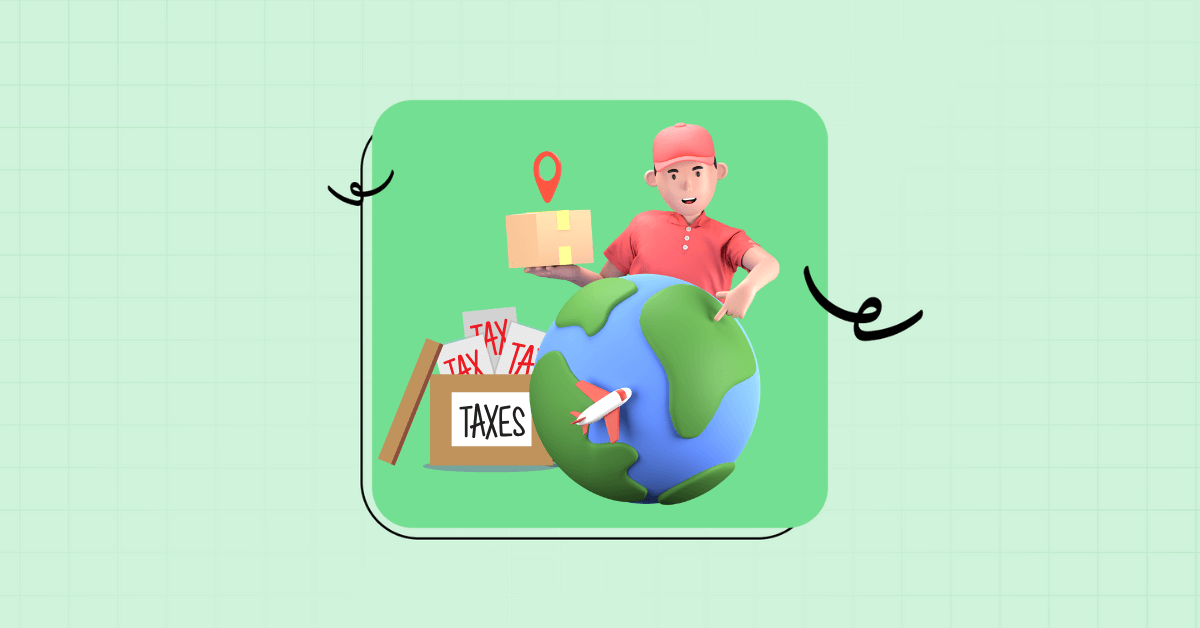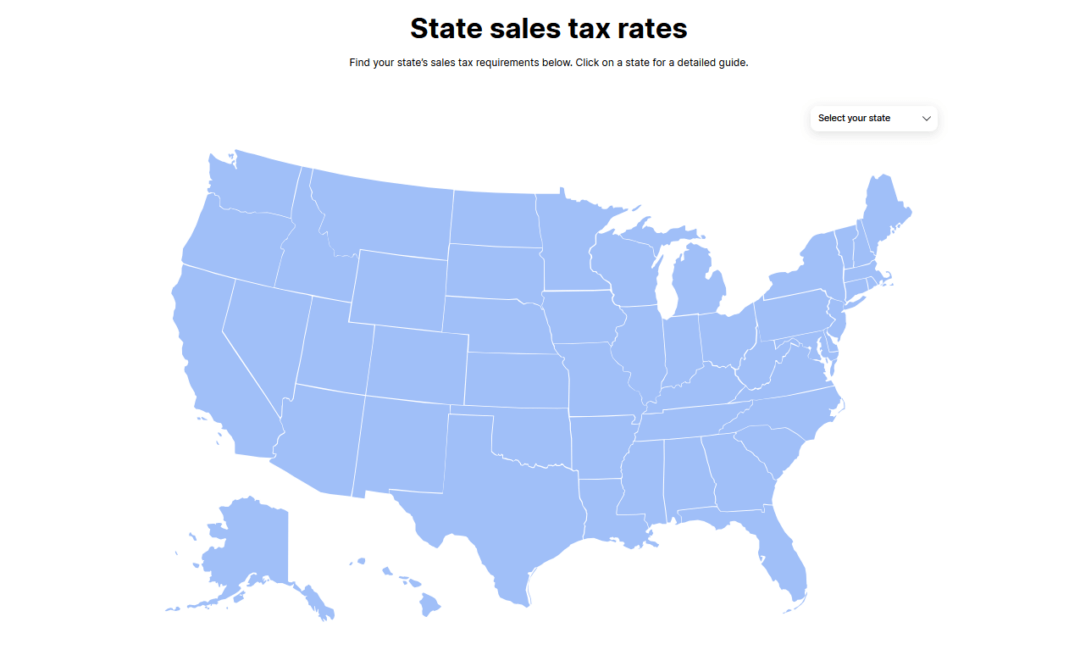
Tax rules regarding shipping vary by state, how the charge is presented, and what you’re selling.
That complexity makes it easy to get wrong, but it is also fixable with the proper guidance.
When Maya launched her small handmade candle shop online, she never imagined shipping fees would cause a tax headache.
But after sending hundreds of orders nationwide, she received a notice: she had miscalculated shipping tax in 3 different states and now owed penalties and back taxes.
Maya’s story isn’t uncommon. Shipping and handling charges are one of the most misunderstood areas of sales tax compliance for e-commerce sellers.
Most new founders end up asking themselves or googling “Is shipping taxable?”
That’s why doola’s Sales Tax and Reseller Certificate is here to help you stay compliant without the guesswork. You’ll save time, avoid costly errors, and get peace of mind.
Let’s break down everything you need to know about sales tax and how to stay compliant without drowning in the tax code.
Understanding the Basics: What Counts as Taxable Shipping?
In tax terms, “shipping,” “delivery,” and “transportation charges” refer to the cost of moving a product from you (the seller) to your customer.
These charges can take many forms: flat-rate fees, real-time carrier rates, or even free shipping that you absorb into your pricing.
If you’re just starting to sell online, here’s the simplest way to understand it:
If the item you’re selling is taxable, and shipping is part of the sale, then the shipping cost is often taxable too, unless your state says otherwise.
That’s why something as small as how you label or break out shipping on a customer invoice can influence your tax liability.
But here’s where it gets tricky. Some states treat these costs as part of the overall sale, making them taxable, while others treat them separately under certain conditions.
The confusion often stems from how shipping is listed on receipts or invoices. Some states will exempt shipping if it’s separately stated in invoices or optional, like in-store pickup.
However, when shipping is clearly itemized, some states may treat it as a separate, non-taxable charge, especially when the items shipped are non-taxable themselves.
📌 doola’s Pro Tip for the Do’ers:
Always separate shipping from product prices on your invoices. This can make a big difference in states that offer exemptions for itemized delivery fees.
Why Shipping Taxes Vary by State

There’s no universal sales tax rule. Each state sets its own rules, and what’s perfectly compliant in one state could land you in trouble in another.
The first layer of complexity lies in whether a state follows origin-based or destination-based tax rules.
In origin-based states, the sales tax is determined by the seller’s location. In destination-based states (which make up the majority), it’s based on where the buyer takes possession of the item.
Then there’s nexus, a legal term indicating a physical or economic connection to a state that requires you to collect and remit sales tax.
And here’s where it gets especially tricky since some states take a stricter stance on the shipping tax.
If you sell to customers in multiple states or are growing fast, you could unintentionally trigger nexus and fall out of compliance without even knowing it.
Some states take this rigorous approach even further. Here’s a quick breakdown of how some states handle shipping tax:
| State | Scenario | Is Shipping Taxable? | Why? |
| 1. Florida | You sell a $20 mug and charge $5 for shipping, listed separately. | ✅ Yes | Florida includes shipping in the taxable amount, even if it’s itemized separately. |
| 2. Oregon | You sell a $30 notebook and charge $5 for delivery. | ❌ No | Oregon has no state sales tax, so no tax on the item or shipping. |
| 3. Texas | You sell $50 in tax-exempt groceries and charge $10 for delivery. | ❌ No | If the products are tax-exempt, shipping is generally exempt too. |
| 4. New York | You ship a bundle of taxable (candles) and non-taxable (tea) items for $100, including shipping. | ✅ Yes | If any part of the sale is taxable, shipping is taxable unless charges are separated clearly. |
| 5. California | You offer free shipping on a taxable item (price includes shipping). | ✅ Yes | Shipping is considered taxable when included in the product price. |
| 6. Illinois | You list shipping separately on an invoice for taxable products. | ❌ No | Illinois exempts separately stated shipping on taxable items. |
| 7. Pennsylvania | You charge for both handling and shipping as separate fees. | ✅ Yes | If handling is taxable, the entire delivery charge can become taxable. |
Shipping tax rules can quickly get overwhelming, especially if you’re selling into multiple states or expanding your online store.
That’s where doola’s Sales Tax & Reseller Certificate services can help simplify sales tax compliance, alert you when you’ve triggered nexus in a new state, and ensure your shipping charges are taxed correctly (or not at all), when possible.
No guesswork. No spreadsheet chaos. Just confidence that you’re doing it right.
Book a demo with doola and let our experts help you simplify multistate compliance with ease.
Common Scenarios: When Is Shipping Taxable?
Many small business owners have faced the frustration of finding out (too late) that their shipping setup triggered unexpected tax obligations.
The truth is, it depends on what you’re selling, where you’re shipping it, and how you structure the charge.
Think about three product types you sell. Are they all taxable? If not, your shipping charges might be treated differently for each.
Let’s break it down with some real-life examples you may encounter and what to do in each case.
| Scenario | Taxable? | Why It Matters |
| Shipping fee included in total product price | Often taxable | If shipping isn’t broken out as a separate line item, many states treat it as part of the taxable sale. |
| Shipping fee is listed separately for taxable items | Sometimes taxable | States like Texas still tax it, but others (like Illinois) may exempt it if separately stated. |
| Shipping fee is listed separately for non-taxable items | Often not taxable | In states where shipping of exempt goods (like groceries or books) is also exempt, listing the shipping separately strengthens your case. |
| Shipping for a bundled product (taxable + non-taxable items) | Often taxable | If the shipment contains both taxable and exempt items, most states tax the entire shipping charge. |
| Flat-rate shipping regardless of order contents | Varies | Flat fees can trigger taxability if the state considers the charge part of the sale price. |
| Digital products (like eBooks or courses) | Usually not taxable | No physical shipping is involved; however, always confirm if the digital product itself is taxable in that state. |
📌 doola’s Pro Tip for the Do’ers:
Always list shipping separately on invoices and receipts. In many states, this simple detail can mean the difference between being taxed and not.
What About Handling, Delivery & Freight Charges?
Shipping isn’t the only cost that gets tangled up in sales tax questions. You may also have to collect taxes for handling, delivery services, freight, or even white-glove installations.
Many sellers confuse handling fees with shipping, but they aren’t quite the same.
Shipping refers to the actual transport of the item to your customer, while handling includes labor, packaging, and materials used to prepare the order for shipment.
In most states, if the product you’re shipping is taxable, any handling fee is also considered taxabl,e even if it’s listed as a separate line item.
Delivery
Delivery goes beyond shipping, like setting up furniture or appliances, which can be partially or fully taxable, depending on the state and how it’s invoiced.
Dropshipping
In many states, the taxability of shipping depends on whether the end customer is being charged for it and who holds the resale certificate.
If you’re drop shipping, ensure your supplier and your invoicing align with your tax collection responsibilities to avoid double taxation or compliance issues.
Freight Charges
While B2B sellers might assume this falls outside standard tax rules, many states treat freight just like standard shipping and apply tax if the items being delivered are taxable.
In some states, if the buyer provides a valid resale or exemption certificate, both the product and freight may be tax-exempt.
However, the question is whether you charge a flat shipping rate or calculate based on weight, speed, or zones?
That choice alone can influence how your fees are taxed in different states. For example, flat-rate “shipping & handling” is more likely to be taxed as a bundled service.
On the other hand, clearly separated and itemized charges might avoid unnecessary tax in certain jurisdictions.
That’s why doola’s Sales Tax & Reseller Certificate service helps you manage the sales tax compliance for your business.
So, you never have to guess whether your freight or white-glove service is taxable in New York but exempt in Oregon.
How to Stay Compliant With Varying State Laws
Staying compliant isn’t just about checking a box once. It’s about building a routine that keeps you ahead of audits and surprises.
States update their tax rules regularly, especially when it comes to e-commerce, where shipping practices, product categories, and economic nexus laws evolve fast.
States are constantly adjusting their tax regulations to close loopholes, capture more digital revenue, or respond to federal changes (like the 2018 South Dakota v. Wayfair decision).
Here’s a simple 4-step checklist to help you stay on track:
✅ Confirm nexus: Are you legally required to collect sales tax in a state? Check for both physical and economic nexus.
✅ Check product taxability: Not everything is taxable in every state. Know your catalog inside and out.
✅ Review shipping practices: Are you bundling charges? Itemizing correctly? Different states mean different rules.
✅ Collect & remit tax: Are you registered, collecting the right rates, and filing returns on time?
With these basics in place, you’re already ahead of most sellers. And if that still feels like a lot to manage manually, automation is your friend.
Using a modern tax compliance tool ensures your business adapts in real-time, with updated rates, rule changes, and reporting requirements handled for you.
However, some businesses have complex requirements, such as international transactions, mergers, and tax disputes, for which they hire a tax advisor.
Tools and Resources to Simplify Sales Tax Compliance
Imagine that you never once have to stress about whether you’re collecting the right sales tax, filing on time, or dealing with confusing rules on shipping or handling fees.
No more second-guessing shipping rules across dozens of states. No more chasing down rate changes or scrambling during sales tax season.
To get there, you need the right tools, such as manual spreadsheets to powerful automation platforms.
However, every business has different needs, budgets, and levels of complexity. Here’s a quick look at what’s available.
| Solution Type | Best For | Pros | Cons |
| DIY Spreadsheets | Solopreneurs or early-stage sellers in 1–2 states | Free, total control | Easy to make mistakes, not scalable, and manual updates |
| SaaS Tools (e.g., TaxJar, Avalara) | Growing sellers managing multi-state sales | Real-time tax calculations and automated filings are integrated with Shopify, Amazon, etc. | Monthly fees, complex setup, limited customization |
| Accountants/Tax Professionals | Larger businesses or unique sales models | Human oversight, help with audits, or exceptional cases | Expensive, slower response times, still needs manual prep |
| doola (An All-in-One Compliance Tool) | Founders scaling fast, selling online or across states | All-in-one: nexus tracking, sales tax, reseller certificates; startup-friendly; done-for-you support | Best for digital-first or e-commerce-focused businesses |
Founders who invest early in the right compliance setup don’t just avoid headaches. They scale faster, smarter, and with more peace of mind.
Just clear, reliable, automated compliance handled in the background so you can focus on building your business.
That peace of mind isn’t a luxury; it’s a competitive advantage for founders who think ahead.
That’s where doola shines. Instead of offering just another dashboard or tax plugin, doola gives you an all-in-one compliance engine:
- Track where you owe sales tax (based on economic or physical nexus).
- Collect reseller certificates for tax-exempt sales.
- File your returns on time.
- Support your back office as your business scales.
In short, doola handles the paperwork so you can focus on the dream work.
Simplify Sales Tax Compliance With doola

With doola, you don’t just get a tool. You get a system built for entrepreneurs who want to track their income and expenses, manage sales tax filings, and stay compliant, all in one place.
This gives you clarity, control, and compliance from the start. Here’s what you can expect with doola:
🚀 Full Sales Tax Support: Including multi-state sales tax tracking, shipping tax handling, and reseller certificates.
🚀 Automated Filings: No more last-minute crunch or missed deadlines.
🚀 Simple Onboarding: No complicated setups or confusing dashboards.
🚀 Bookkeeping & Analytics: Real-time insights into your finances, not just taxes.
We’re here to support your next big move, whether you’re entering a new market, launching a new product, or expanding internationally.
Book a demo to see how doola can help you automate the complex parts and focus on what you do best.
FAQs

Is shipping taxable if I offer free shipping?
If shipping is free, there’s usually no tax. However, in some states, free shipping is still considered part of the total sale price and may be taxable if the item itself is taxable.
Do I need to collect tax if I ship to a state where I don’t have nexus?
No. You’re only required to collect sales tax in states where you have nexus. But be aware: thresholds change, so it’s wise to monitor your activities across states.
Is digital product delivery considered taxable shipping?
Not typically. However, some states tax digital goods, while others don’t — and a few even have specific exemptions for things like educational materials or business software.
What if I refund an order? Do I also refund the tax?
Yes. If you issue a full refund, the best practice is also to refund the associated sales tax to the customer.
Be sure to document refunds properly in your tax records so you can reconcile them accurately during tax filing, especially if you’re applying for a refund or deduction for previously remitted tax.



